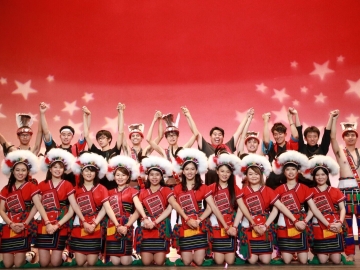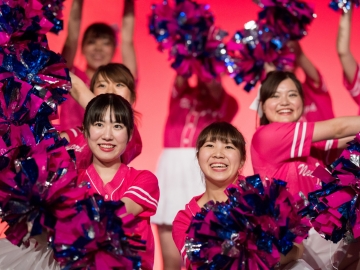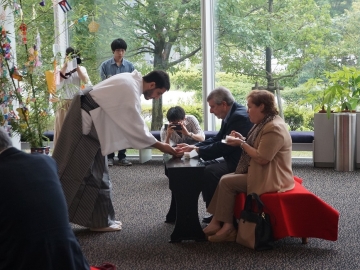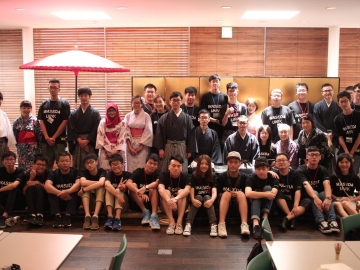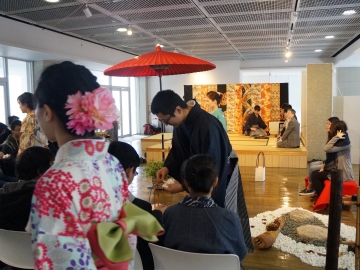Popular student clubs among international students
Mon, Oct 2, 2017-
Tags
Working towards its mid-long term vision, the Waseda Vision 150, Waseda University is aiming to increase the number of international student intake to 10,000 by 2032 (5,413 as of May 2017) . On September 23, the University welcomed a large number of international students on the school entrance ceremony whose presence not only adds colors but also liveliness to the campuses.
Waseda Weekly, the online magazine for Waseda students, is featuring two out of the 600 official students clubs (commonly known as sakuru or circles in Japan) that are particularly popular among international students in this article.
Waseda International Festival (W.I.F.) Student Club
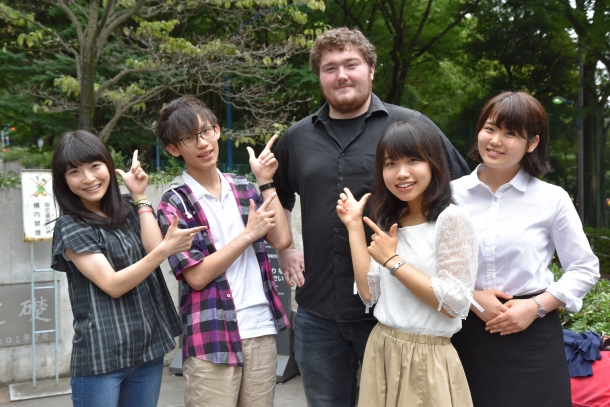
The ever lively and cheerful members of W.I.F.
Vice-president Sumika Nakashima
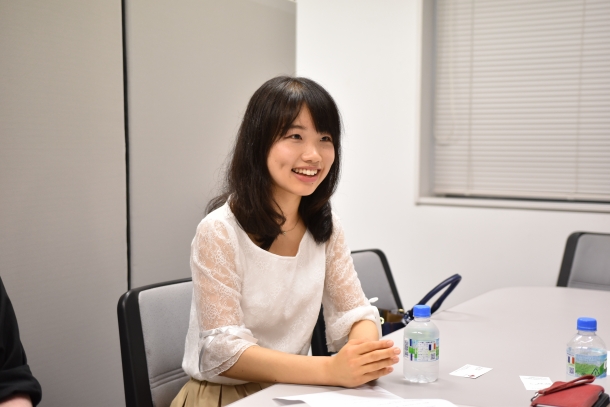 First year student of the School of International Liberal Studies (SILS)
First year student of the School of International Liberal Studies (SILS)
Q: What do you do at Waseda International Festival (W.I.F.)?
At W.I.F., we communicate and interact with one another through various dances from all around the world two times a week. We often perform in public during events such as Student Cultural and Arts Festival and Waseda Festival, taking place in June and November respectively. Among the dances, Soran Bushi (a traditional song and dance by fishermen of Hokkaido) and Ami tribe dance (a folk dance of the Amis Taiwanese aborigine) are particularly popular, so we perform them every year. This year, we will also be performing cover dance of K-POP and dances from Jamaica and the United States. Aside from dancing, we also organize events based on seasons. Among the 100 student members, more than 40% of them are international students. As such, at W.I.F., you will find students of diverse backgrounds and nationalities.
Waseda Student Cultural and Arts Festival – 1. Soran Bushi (left), 2. Ami tribe dance (center), and 3. Cheerleading (right).
Q: Why is W.I.F. so popular among international students?
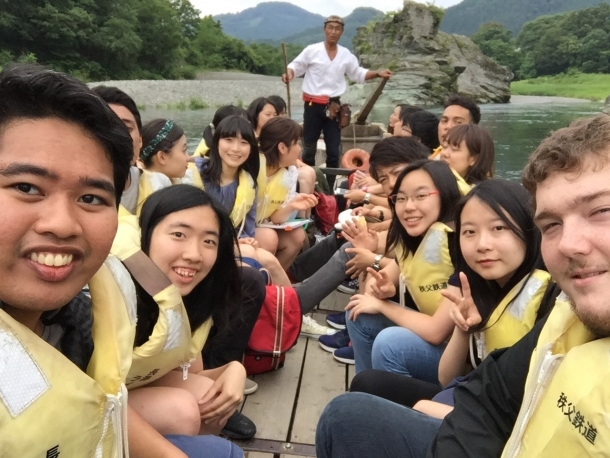
Camp at Nagatoro in June
I think low language barrier is probably one of the main reasons why W.I.F. is popular among international students. At W.I.F., Japanese students do make an effort to communicate in English on a daily basis. When we give out instructions for dances, we do not only use Japanese but also English whenever it is necessary. Because of that, international students who have just come to Japan and are not confident with their Japanese language skills or those who do not speak Japanese at all because they are enrolled in the English degree programs at Waseda can feel at ease and comfortable joining us. When the new semester starts in September, W.I.F. will also be actively helping and supporting international students by providing help and advice on class registration, and answering any questions they may have regarding living in Japan. Through these effort and initiatives by the student club, we hope that more international students will join us. Additionally, another possible reason why W.I.F. is so popular among international students is probably because the international students at W.I.F. are always having fun and enjoying themselves at the club.
Q: What are some of the benefits of having many international students joining the club?
As international students come from different countries and regions, it is a good opportunity to be exposed to, as well as learn and appreciate different ways of thinking and lifestyles for both Japanese students and international students alike. As Japanese students interact with international students and vice versa, students soon realize attributes that divide us, such as nationality, are not important. In fact, diversity also exists among Japanese students. Some Japanese students have never stepped out of the country but there are others who have lived abroad before coming back to Japan. I personally did not have the chance to interact with students from overseas before I came to Waseda University.
Q: What message do you have for the international students who have just joined Waseda University?
Whether you are looking to make more Japanese friends or are interested in learning traditional folk dances, we hope that many of you will join us and have fun with us. Here at W.I.F., we are interested in trying out new things as well as things students are interested in doing. We hope that your life in Japan will become even more enjoyable because of W.I.F., and we want to be the reason why international students have memorable memories about Japan when they look back upon their student life in the country.
How international students feel about W.I.F.
Can you tell us why you decided to join W.I.F.?
Thomas Curtis (American), second year student of School of Fundamental Science and Engineering
I came to know about W.I.F. during the freshmen party in September. Everyone was really friendly and that made me decide to join them. Another reason was because during the freshmen party, the leader of the team I was in was born in a state of the U.S. where I lived before, making us really close.
Liang Yifei (Taiwanese), second year student of School of International Liberal Studies
Before coming to Japan, I heard about W.I.F. in the Waseda Taiwanese Student Association in Taipei. I was really bad at dancing but after knowing a senior who is a member of W.I.F. during the class registration session when I first came to Waseda, I decided to give it a try. Even though I could speak almost no Japanese when I first came to Japan, the members of W.I.F. were really kind and tried their best to talk to me in English. I felt really comfortable and like the atmosphere of the student club and decided to join them.
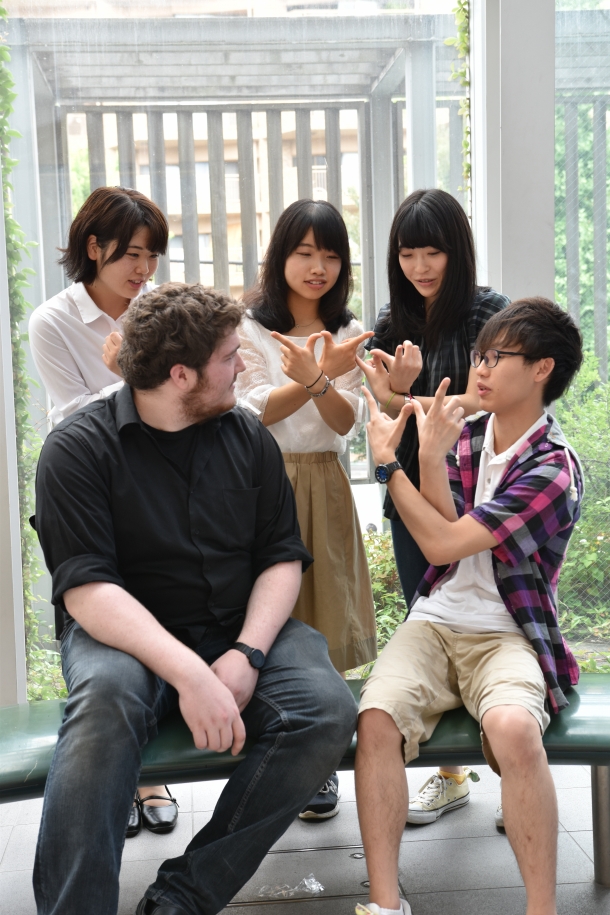
W.I.F. members teaching one another how to make the “W” sign that stands for Waseda.
Q: How do you find W.I.F.?
Liang:
I belong to the Soran Bushi, Amis, American and Scottish dance teams and have made a lot of friends. Addtionally. we also have lots of opportunities to mix with students from other teams. It is really fun and I spend good quality time with the members at W.I.F.. Last year, I when I first came to Waseda University, I spoke mainly in English because I could barely speak a word in Japanese. However, after joining W.I.F., I started speaking more and more Japanese each day. Now, I can converse fully in Japanese without much difficulty. This is all thanks to the people at W.I.F., who taught me Japanese and practiced it with me.
Curtis:
I am from the School of Fundamental Science and Engineering and there are a lot of compulsory classes I need to take. Additionally, because the campus I belong to is not main campus where the club activities mainly take place on, I am not as active as other members of W.I.F.. Having said so, I am really glad that I joined W.I.F.. Even though W.I.F. is primarily a dance club, there are many opportunities for us to talk to and mingle around with each other. I often meet up in private with some the members of Soran Bushi team which I belong to.
Q: Do you have any message or advice for the freshmen in Waseda University?
Liang:
My advice to the freshmen is to challenge yourself and try new things. In my case, I was really bad at dancing and even today, it is hard for me to believe that I actually joined W.I.F.. Having said so, my university life has become so much more colorful and enjoyable because I joined W.I.F..
Curtis:
I joined W.I.F. last year and I really enjoyed myself there. Even today, I am always looking forward to meeting the members and spending quality time in their company. I hope many international students will join us this year just like previous years.
Tea Ceremony Club (Kitakyushu Campus)
1. Tea serving to the Ambassador of Cuba (left), 2. Summer school (center), and 3. Tea ceremony demonstration at a symposium organized with overseas universities (right).
President Toru Tachikawa
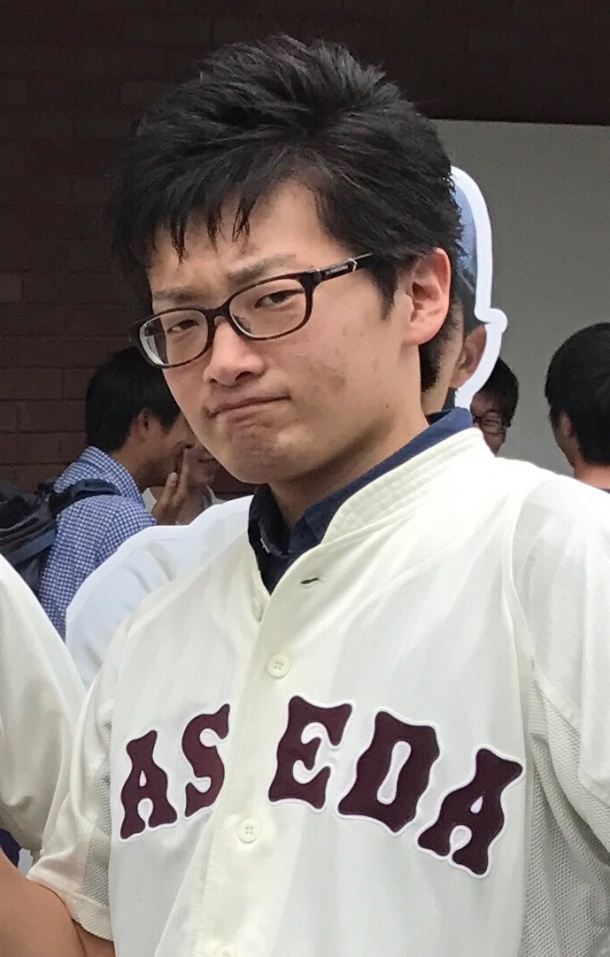 Second year student of the Graduate School of Information, Production and System (Kitakyushu Campus)
Second year student of the Graduate School of Information, Production and System (Kitakyushu Campus)
Q: What do you do at the Tea Ceremony Club?
At the Tea Ceremony Club, we learn to appreciate peace of mind and the spirt of monozukuri (vaguely and commonly translated as “making things” or “craftsmanship”) through the art of traditional Japanese tea ceremony. At the club, there are currently six Japanese and 24 international students.
When academic conferences or summer schools programs are held in Kitakyushu campus, we often have guests from overseas and children from other part of Japan visiting us. As part of cultural exchange, we have our visitors and guests experience traditional Japanese tea ceremony where we serve them tea. Additionally, we also conduct the authentic tea ceremony in a traditional Japanese-style room by male international students for locals from other regional parts of Japan once every year. It has been receiving favorable responses and each year many visitors from prefectures such as Kagoshima, Hiroshima and Yamaguchi come to attend it. Moreover, our tickets are usually sold out within 10 days, suggesting the strong support from these locals.
Q: What are some of the benefits of having many international students joining the club?
Looking at how international students express interests in cultures from other countries, it raises our own (Japanese people’s) awareness. Graduate students like myself often have to go overseas for academic conferences and it is very embarrassing if we know nothing about our own culture. By interacting with these international students from the Tea Ceremony Club, it makes us not want to lose to them in a positive way, and thus encouraging growth from both parties in the process.
In addition, tea ceremony is a culture of conceptual ideas. International students come from different up-bringing backgrounds and thus shared different beliefs and values. As such, they tend to have a lot of questions about tea ceremony. We make it a point to set a side time to explain them using pamphlets and power point in Japanese and English.
Q: What message do you have for the freshmen who have just joined Waseda University?
One of my Chinese seniors who is a graduate of the Graduate School of Information, Production and System set up a Japanese tea ceremony business in China in hope to promulgate it in his home country. In fact, the Tea Ceremony Club has made three trips to China to hold tea ceremonies. I will be very happy if the art of Japanese tea ceremony will continue to expand to Taiwan, South Korea, Thailand, Vietnam, Asia and other parts of the world. As such, I am looking forward to having more juniors join us at the Tea Ceremony Club.
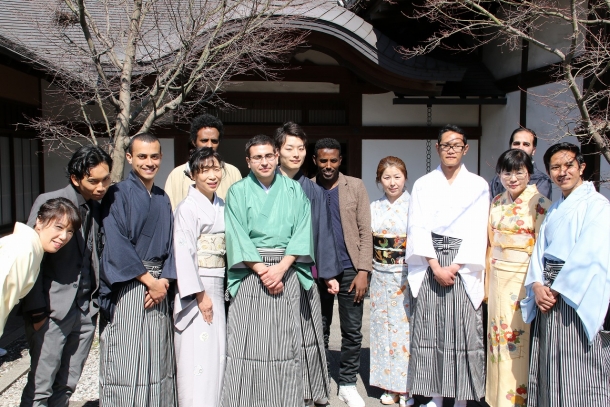
An event at Kokura Castle.
How international student feel about the Tea Ceremony Club
Can you tell us why you decided to join the Tea ceremony Club?
Fam Rashel Putraruddy Scala (Indonesian), PhD candidate from the Graduate School of Information, Production and System
I have always been interested in Japanese culture and like drinking tea because it makes me feel relax and calm. So, when I knew that there is a Tea Ceremony Club at Kitakyushu campus, I decided to join it.
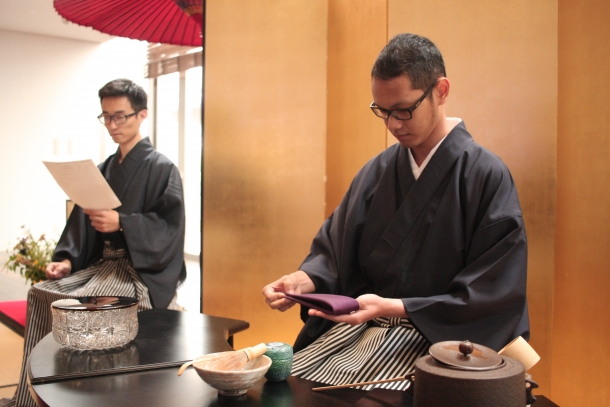
Fam (the person on the right) serving tea in tea ceremony.
Q: What do you think of the Tea Ceremony Club?
I really enjoy myself at the Tea Ceremony Club. I enjoy the tea ceremony and also the company of the members who come from different countries and various part of Japan. It is a great place to learn about cultures different from mine. In Japanese tea ceremony, the tools, decorations and sweets change accordingly to seasons. I think that Japanese tea ceremony is a very delicate and graceful culture. The tea ceremony instructor is also very cheerful and nice, always helping me when I need help.
Q: What does the Tea Ceremony Club mean to you?
It is a place where I can reflect on myself in a quiet space. I get to refresh myself every time I practice tea ceremony when I am tired of doing my research. Every step and move in tea ceremony has its meaning and learning them gives me new insights that can be applied to my daily life.
In tea ceremony, remembering the otemae or procedures of making tea is not easy. The otemae changes accordingly to the tools used and it is also important to use them with care. There are many rules and procedures to remember. As it is a traditional art, it is important to observe and pay attention to the manners involved.
Q: What do you hope to achieve in Japanese tea ceremony?
There are still many things I do not know and need to learn deeper about Japanese tea ceremony. Through tea ceremony, I am able to meet new people and appreciate the equality. I hope to deepen my appreciation in the idea of devoting one’s whole mind, which forms the basis of monozukuri in Japan.
More information on Waseda University’s official students club
You can look up more information on each official student club at Waseda University on the following website here (currently only in Japanese).

You can check how many international students are there in each student club.




